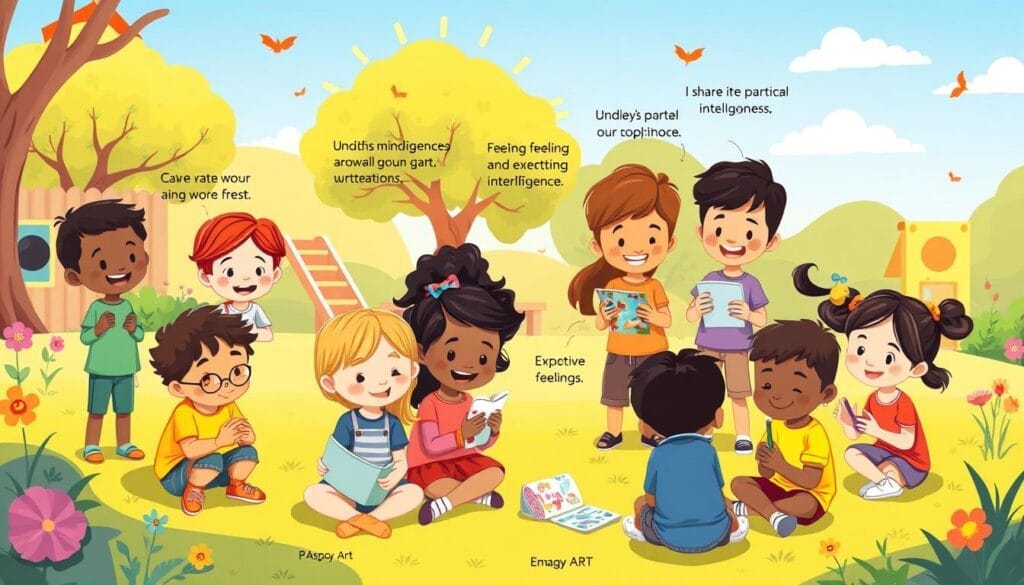Have you ever wondered why your child seems more withdrawn, easily upset, or just “not themselves” lately?
Many parents face this concern, especially in today’s fast-moving, digitally-heavy world. As parents, your actions shape not only your child’s behavior but also their ability to cope with emotions. Understanding the ways parents can support emotional health in children is more important now than ever before.
Emotional health doesn’t always show physical signs. That’s why it’s easy to miss, but its impact can last a lifetime. In this blog, we’ll explore powerful, simple, and science-backed ways parents can support emotional health in children, so you can raise happier, more balanced kids.
Table of Contents
ToggleWhat Are the Most Effective Ways Parents Can Support Emotional Health in Children?
The emotional well-being of children is just as important as their physical growth. It’s what helps them build friendships, manage stress, and succeed in school and life.
According to the CDC, 1 in 5 children has a diagnosable emotional or behavioral disorder. Yet, many go unnoticed and unsupported. That’s why learning the ways parents can support emotional health in children is critical.
When parents step in early and offer consistent emotional support, children develop better coping skills, stronger self-esteem, and improved school performance. Emotional health is not optional; it’s foundational.
Why Is Emotional Health in Children Often Overlooked?
Many parents focus on physical milestones like height, weight, and grades. But emotional struggles often get brushed off as “just a phase” or “acting out.”
The stigma around children’s emotions
Children are often expected to behave well without being taught how to express feelings.
- Phrases like “boys don’t cry” or “don’t be dramatic” shut kids down.
- Emotional problems are wrongly seen as weakness.
- Parents often feel judged, so they avoid talking about mental struggles.
Ignoring these signs can delay support and deepen emotional issues.
How emotional development shapes adult mental health
What children feel today becomes the lens through which they see adulthood.
- Studies show that childhood emotional trauma can increase the risk of depression, anxiety, and substance abuse later.
- Children who aren’t taught emotional expression may struggle with relationships, jobs, and decision-making.
Supporting child mental health now builds strong adults later.

What Are the Long-Term Benefits of Supporting a Child’s Emotional Well-being?
Taking action early brings lifelong benefits. When we understand the ways parents can support emotional health in children, we shape stronger futures.
Here’s a clear look at the impact of emotional support on your child’s future:
| Benefit Category | What It Looks Like | Real-Life Example |
|---|---|---|
| Higher academic performance | Better focus and classroom behavior | A child who practices deep breathing before tests performs better due to reduced anxiety |
| Better relationships | Improved social bonding and communication | A child who can say “I’m feeling left out” instead of acting out gets along better with peers |
| Lower risk of anxiety, depression, or substance abuse | Early coping skills reduce future mental health problems | A teen who journals their stress is less likely to turn to unhealthy habits |
These benefits prove that learning the ways parents can support emotional health in children goes beyond childhood, it shapes a healthy, stable adulthood
How Can Parents Create a Safe Emotional Environment at Home?
Children need a space where they feel emotionally safe—where they can cry, laugh, or speak their mind without fear.
What Does “Safe Emotional Space” Really Mean?
Creating a safe space is more than keeping sharp objects away or locking doors.
- Emotional safety means your child knows they won’t be judged.
- It’s a space where they can feel sad or angry without being shamed.
- Emotional safety builds confidence to open up.
How Can Open Communication Help?
Talking about feelings isn’t a one-time talk. It’s ongoing.
- Use feelings-related words daily: “Are you feeling angry, sad, or nervous?”
- Let your child finish without cutting them off.
- Say things like, “I see you’re upset. Want to talk about it?”
When kids feel heard, they feel valued.
What Role Does Consistency and Routine Play in Emotional Stability?
Children thrive on predictability. Routines make them feel secure.
| Routine Element | Emotional Benefit |
| Regular bedtime | Reduces anxiety |
| Set mealtimes | Builds connection |
| Limited screen time | Encourages real communication |
Predictable environments reduce stress and emotional confusion.

Setting Boundaries and Expectations
Creating a supportive family environment starts with clear boundaries and expectations. Rules and routines give stability and reduce stress. They help children know what’s expected of them.
Importance of Consistency
By age 3, kids show concern for crying friends or help when needed. Social skills coaching works best in real-time. Parents can teach kids to set boundaries early.
Consistent rules help kids understand boundaries better. This leads to a 20% more adherence to set limits, like screen time before bed.
Clear Communication of Rules
Parents should talk about rules in simple terms. Explain consequences calmly and use positive discipline. This helps kids understand what’s expected and reduces frustration.
Trust grows when consequences are followed. This makes parents 30% more credible in guiding and making decisions. Praising positive behaviors can increase rule-following by 25%.
Letting kids express themselves boosts self-esteem and decision-making. It lowers anxiety by 15%. Dismissing kids’ boundaries is common, but it shows love and care.
Adults need self-care to maintain healthy boundaries while caring for kids.
Encouraging Positive Relationships
Fostering secure parent-child bonds is key for building emotional resilience in youth. Studies show that kids with positive relationships with parents handle stress better. About 6 out of 10 kids in the U.S. have these secure bonds. But, 4 out of 10 lack them, which can cause serious behavior issues.
Supporting Friendships
Parents are crucial in supporting their kids’ friendships. They can arrange playdates for younger kids or encourage older kids to have friends over. Teaching kids to solve problems actively makes them feel ready for friendship challenges.
Teaching Conflict Resolution
Teaching empathy, respect, and accepting differences is vital for social growth. By teaching kids how to solve conflicts, parents help them keep friendships strong. Letting kids face tough situations and guiding them helps them learn to handle conflicts well.
Building positive relationships teaches kids self-control and reduces bad behavior. It also strengthens the bond between parents and kids. This supports the emotional resilience and well-being of youth.

How Can Parents Teach Emotional Regulation to Their Kids?
Teaching emotional control isn’t about stopping outbursts—it’s about guiding kids to express their feelings in a healthy way.
What Are Age-Appropriate Ways to Help Kids Manage Emotions?
Every age has different needs. Teaching must match maturity.
- Toddlers: Help them name feelings. Say, “You look angry. Is that right?”
- School-age kids: Introduce breathing exercises or a “feelings” chart.
- Teens: Suggest journaling or guided meditation apps.
The goal is not to stop emotions but to manage them.
How Do Parents Model Emotional Intelligence Themselves?
Children mirror what they see. Show them how to handle emotions calmly.
- Say, “I’m feeling frustrated, so I’ll take a deep breath.”
- Avoid yelling or slamming doors.
- Share your coping strategies like walking or talking to someone.
Emotional intelligence for kids starts with emotionally aware parents.
Are Emotional Outbursts Normal? How Should Parents Respond?
Yes, they are normal! But how you respond matters.
- Don’t yell or shame. Stay calm.
- Acknowledge the feeling: “It’s okay to be upset.”
- Set limits: “But hitting is not okay.”
This teaches that all emotions are okay, but not all behaviors are.
Can Nutrition, Sleep, and Exercise Affect a Child’s Emotional Health?
Yes, and the connection is stronger than most people think.
How Does Diet Impact Mood and Behavior in Children?
Food is fuel, for the brain too.
- Omega-3s and iron help boost mood.
- High sugar and artificial dyes increase irritability and hyperactivity.
- Studies show links between diet and ADHD symptoms.
Nutritious food helps balance emotions naturally.
How Much Sleep Do Children Really Need for Mental Stability?
Sleep is like medicine for the mind. Here’s a CDC-recommended chart:
| Age | Recommended Sleep |
| 3-5 years | 10-13 hours |
| 6-12 years | 9-12 hours |
| 13-18 years | 8-10 hours |
Lack of sleep causes mood swings, tantrums, and focus issues.
Is Physical Activity Linked to Emotional Resilience?
Exercise isn’t just for fitness, it affects mood directly.
- Physical activity boosts endorphins, the brain’s happy chemicals.
- Reduces screen-time stress.
- Encourages outdoor play and social skills.
Learning how to build emotional resilience in children starts with movement.

Resilience is a key skill for kids to manage stress and bounce back. By teaching problem-solving and a growth mindset, parents are crucial. They help kids become confident and adaptable adults.
When Should Parents Seek Professional Help?
Not every emotional issue needs therapy, but some do. Knowing the signs helps.
What Are the Signs of Deeper Emotional Issues in Children?
Look out for long-lasting changes in behavior.
- Mood swings or aggression beyond usual behavior.
- Avoiding friends or activities.
- Sleep, eating, or school performance dropping.
These could be signs of emotional distress in kids needing expert care.
Which Experts Can Help with Emotional Health in Children?
Several professionals can help support emotional healing.
- Pediatricians for initial screening.
- Child psychologists or therapists for ongoing help.
- School counselors for support during class hours.
How Can Therapy Support Both Children and Parents?
Therapy helps both the child and the parent.
- Play therapy works well for younger kids.
- Cognitive behavioral therapy (CBT) helps school-age children manage thoughts and feelings.
- Family therapy improves parent-child communication.
Breaking the stigma around therapy makes space for healing.
Supporting Emotional Health Today Leads to Brighter Tomorrows
Children deserve emotional support as much as physical care. By learning and applying the ways parents can support emotional health in children, you give them the tools to thrive in every stage of life.
If your child is showing emotional struggles or you’re unsure how to help, book a consultation with Dr. Chandril Chugh today. Don’t wait until small issues grow bigger.
FAQ
What is emotional health and why is it important for children?
Emotional health in kids means they can form safe, stable friendships. It helps them trust others, make friends, and handle their feelings. Emotional well-being is key for kids to grow and face life’s challenges.
How can parents create a safe space for their children to express their emotions?
To create a safe space, parents should talk openly and listen without judging. Be ready to chat, ask open-ended questions, and talk during car rides or walks. This makes kids feel heard and valued.
What are some practices to help parents recognize and validate their children’s emotions?
It’s important to acknowledge and validate kids’ feelings. Use “emotion coaching” to help them understand and manage their feelings. Color zones can help younger kids label their emotions.
How can parents model healthy emotional responses for their children?
Show kids how to handle emotions by being calm and open. Share how you feel and handle your emotions. This teaches kids valuable lessons.
Why are clear boundaries and expectations important for children’s emotional health?
Clear rules and routines are essential for kids’ emotional health. They provide stability and reduce stress. Explain rules clearly and use positive discipline. This helps kids know what’s expected and reduces frustration.
What books or movies can help teach emotional intelligence to kids?
Books like “The Color Monster” or “When Sophie Gets Angry” help with teaching kids about feelings. Movies like “Inside Out” also teach emotional labeling and coping.
How can parents encourage positive relationships and social development in their children?
Encourage friendships by arranging playdates or inviting friends over. Teach conflict resolution and empathy. This helps kids develop strong social skills.
What are some healthy coping mechanisms parents can teach their children?
Teach kids stress relief techniques like deep breathing and creative activities. Art, music, or writing can help them express themselves and feel better.
How can parents help their children develop resilience?
Teach kids to solve problems and praise their effort. View failures as learning chances. This builds confidence and resilience in kids.
When should parents seek professional support for their child’s emotional health?
Seek help if your child’s behavior or mood changes a lot. School counselors, pediatricians, and mental health professionals can offer valuable support.
How can the whole family support a child’s emotional health?
Involve the whole family in supporting emotional health. Have regular family meetings and do activities together. This strengthens bonds and supports emotional well-being.
About The Author

Medically reviewed by Dr. Chandril Chugh, MD, DM (Neurology)
Dr. Chandril Chugh is a U.S.-trained, board-certified neurologist with expertise in diagnosing and managing neurological disorders, including migraines, epilepsy, Parkinson’s disease, and movement disorders. His clinical focus includes evidence-based neurological care and patient education.
All content is reviewed for medical accuracy and aligned with current neurological guidelines.




